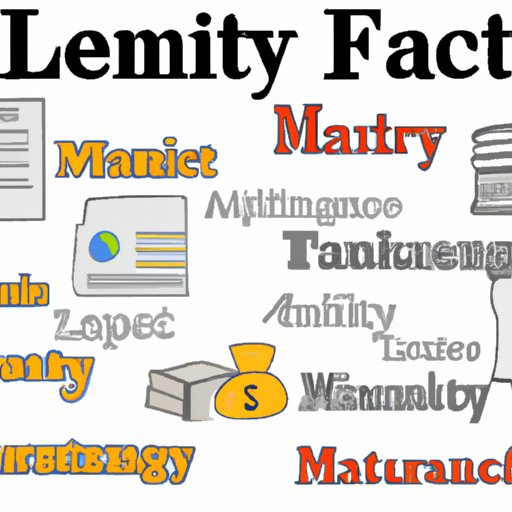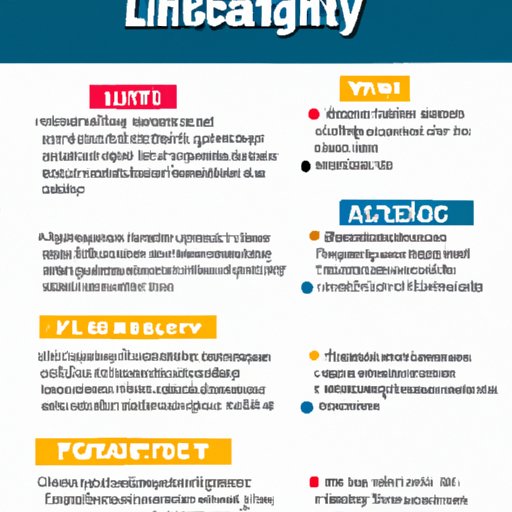Introduction
Financial literacy is an important skill that everyone should strive to develop. It involves having a good understanding of money, budgeting, saving, investing, credit, debt, and retirement planning. Unfortunately, many people lack the knowledge necessary to make sound financial decisions, leading to problems like high levels of consumer debt and inadequate retirement savings. In this article, we’ll explore the best definition of financial literacy and provide a comprehensive guide to understanding the basics of personal finance.

An Overview of Financial Literacy: What It Is and Why It Matters
At its core, financial literacy is simply the ability to understand and effectively manage one’s finances. According to a 2019 survey from the National Foundation for Credit Counseling, only 57% of Americans could correctly answer five basic financial literacy questions. This means that many people lack the knowledge needed to make sound financial decisions.
But why is financial literacy so important? For one, it can help individuals achieve their financial goals, such as buying a home or saving for retirement. It also helps people protect themselves against fraud and identity theft. Furthermore, it can lead to increased financial security, better career opportunities, and improved overall well-being.

A Comprehensive Guide to Understanding the Basics of Financial Literacy
Understanding the basics of financial literacy is essential for making sound financial decisions. Here’s a quick overview of some of the key concepts:
Types of Financial Assets
Financial assets are items that have monetary value. They can be divided into two categories: liquid assets and non-liquid assets. Liquid assets, such as cash, checking accounts, and savings accounts, can easily be converted into cash. Non-liquid assets, such as real estate and stocks, are more difficult to convert into cash and may require specialized expertise.
Budgeting and Saving
Budgeting is the process of creating a plan for managing your income and expenses. It involves setting priorities and making trade-offs in order to meet financial goals. Saving is the process of setting aside a portion of your income for future use. It’s important to create a budget and stick to it in order to save for things like retirement, college tuition, or a down payment on a home.
Investing
Investing is the process of placing money into assets with the expectation of earning a return. There are different types of investments, such as stocks, bonds, mutual funds, and real estate. Investing can be risky, but it can also be a great way to build wealth over time.
Credit and Debt
Credit is the ability to borrow money and make payments over time. It can be used to purchase items on credit, such as a car or a house. Debt is the amount of money owed to lenders. It’s important to understand how credit and debt work in order to avoid getting into too much debt.
Retirement Planning
Retirement planning is the process of preparing for life after work. It involves setting goals, creating a budget, and investing for the future. Retirement planning is especially important for those who want to maintain their current lifestyle after they stop working.
The Benefits of Financial Literacy: A Look at Its Advantages
Financial literacy has a number of advantages. Here are some of the most notable benefits:
Improved Financial Well-Being
Having a good understanding of financial topics can lead to improved financial well-being. People who are financially literate tend to have better control of their finances and are less likely to make costly mistakes. In fact, according to a study published in The Journal of Consumer Affairs, people who are financially literate are more likely to save money, invest wisely, and achieve their financial goals.
Better Career Opportunities
Financial literacy can also lead to better job opportunities. Employers often look for candidates with a good understanding of financial topics, such as budgeting, investing, and retirement planning. Having these skills can give job seekers an edge over the competition.
Increased Financial Security
Finally, being financially literate can help people feel more secure in their financial future. Knowing how to manage money and plan for retirement can help reduce stress and anxiety associated with finances. It can also lead to greater peace of mind knowing that you’re in control of your financial destiny.

Financial Literacy 101: Exploring the Foundations of Personal Finance
Now that you have a better understanding of what financial literacy is and why it matters, let’s take a closer look at the foundations of personal finance:
Learning the Language of Money
The first step to becoming financially literate is to learn the language of money. This includes understanding terms like income, assets, liabilities, net worth, interest, inflation, and taxes. It’s also important to know how different financial products, such as credit cards and mortgages, work.
Understanding Risk and Opportunity
It’s also important to understand the concept of risk and opportunity when it comes to investing. Risk is the potential for loss, while opportunity is the potential for gain. Investors need to understand both in order to make informed decisions about their investments.
Developing a Financial Plan
Finally, it’s important to develop a financial plan. This involves setting goals, creating a budget, tracking spending, and investing for the future. A financial plan can help people stay on track and reach their financial goals.
The Importance of Financial Literacy: A Closer Look at Its Value
Financial literacy can help people make informed decisions and lead to a variety of benefits. Here’s a closer look at why financial literacy is so important:
How Financial Literacy Helps People Make Informed Decisions
Having a good understanding of financial topics can help people make informed decisions about their finances. This includes understanding the basics of budgeting, saving, investing, credit, debt, and retirement planning. With this knowledge, individuals can make smarter decisions about their money.
Benefits of Financial Literacy in Society
Financial literacy also has a number of benefits for society as a whole. According to a 2016 survey by the FINRA Investor Education Foundation, financially literate individuals are more likely to participate in the stock market, which can help fuel economic growth. Additionally, financially literate individuals are less likely to fall victim to predatory lending practices, helping to protect people from scams and fraud.
Conclusion
In conclusion, financial literacy is an important skill that everyone should strive to develop. It involves having a good understanding of money, budgeting, saving, investing, credit, debt, and retirement planning. Being financially literate can help people make informed decisions and lead to a variety of benefits, such as improved financial well-being, better career opportunities, and increased financial security.
By taking the time to learn the basics of financial literacy, individuals can set themselves up for success and improve their overall financial well-being. It’s an important skill that everyone should strive to develop.
(Note: Is this article not meeting your expectations? Do you have knowledge or insights to share? Unlock new opportunities and expand your reach by joining our authors team. Click Registration to join us and share your expertise with our readers.)
